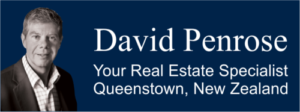
Welcome to my newsletter for November 2018.
With less than four weeks until Christmas it is almost officially the start of Summer here in New Zealand. The year is drawing to a close for us all and 2018 will be yet another year to remember and another chapter in our lives.
It has been a busy year in real estate and last month was no exception. The total volume of property transactions was up compared to the same time last year, with 81 homes, apartments and lifestyle properties changing hands throughout Arrowtown and Queenstown. According to the REINZ, The medium number of days to sell a home, apartment or a section in Queenstown last month was 61 days.
For the Real Estate industry, New Zealand’s long awaited anti-money laundering laws are almost here.
These new laws have been designed to improve the country’s ability to tackle money laundering, terrorism and financing. I understand that government figures reveal about NZ$1.35 billion from the proceeds of fraud and illegal drugs is laundered through what many would consider “normal” local businesses every year. Isn’t this staggering?
The new laws extend to individuals involved in real estate transactions. For conveyancers, lawyers and accountants, the requirements came into force on 1 July 2018. So for myself the requirements come into force on 1 January 2019. This filters right down to anyone who is purchasing property, must meet a certain criteria. I now have a responsibility to carry out due diligence and formal verification to identify both vendors, and purchasers alike.
Can offshore purchasers buy a hotel unit, or an apartment, in New Zealand without applying for an OIA Consent?
If a person is purchasing a hotel unit in a complex of more than 20 units, provided you enter into a lease
back arrangement with the hotel operator/developer and that the lease back arrangement is subject to various conditions – one of which is that the owner cannot occupy the hotel unit for more than 30 days per year, then this may be possible.
Alternatively if you are purchasing an apartment “off the plans” within a multi-storey development of 20 or more apartments, then you can purchase without a consent providing the developer holds either an Exemption Certificate or an Transitional Exemption Certificate.
Singaporean and Australian citizens are eligible to purchase without the need to obtain a consent.
If you wish to seek further clarification on this topic, please contact me directly so that I can advise you accordingly.
What is a LIM Report?
Buying a home apartment or a residential section can be exciting, but it can also be stressful. It’s important to equip yourself with as much knowledge as you can about a property before making any big decisions.
A Land Information Memorandum (LIM) gives a summary of information that our local council holds about a property on the day the LIM was produced. A LIM is the most comprehensive property report available from a council, which is why it’s important for potential buyers to acquire a current one when purchasing a property. Alternatively, buyers can also make a LIM a condition to their purchase.
A LIM report contains useful information on a property that could inform your decision to buy, as well as help you to avoid future surprises. It can give you more information about a property’s history, rates, flood or erosion risk and any consent granted for work done on the property.
If you are considering purchasing a property or selling a property in the Southern Lakes region , I would appreciate the opportunity to advise you, and discuss how I can assist you with your purchase, or market and expose your home, apartment or land like no other in New Zealand.
My telephone number is+64 21 226 1507 alternatively my email address is david.penrose@nzsir.com.
To find out what other events are taking place in the Southern Lakes region, please don’t hesitate to visit this website Discover Queenstown
Twitter: David Penrose Queenstown |




 D5 Creation
D5 Creation
Comments are Closed